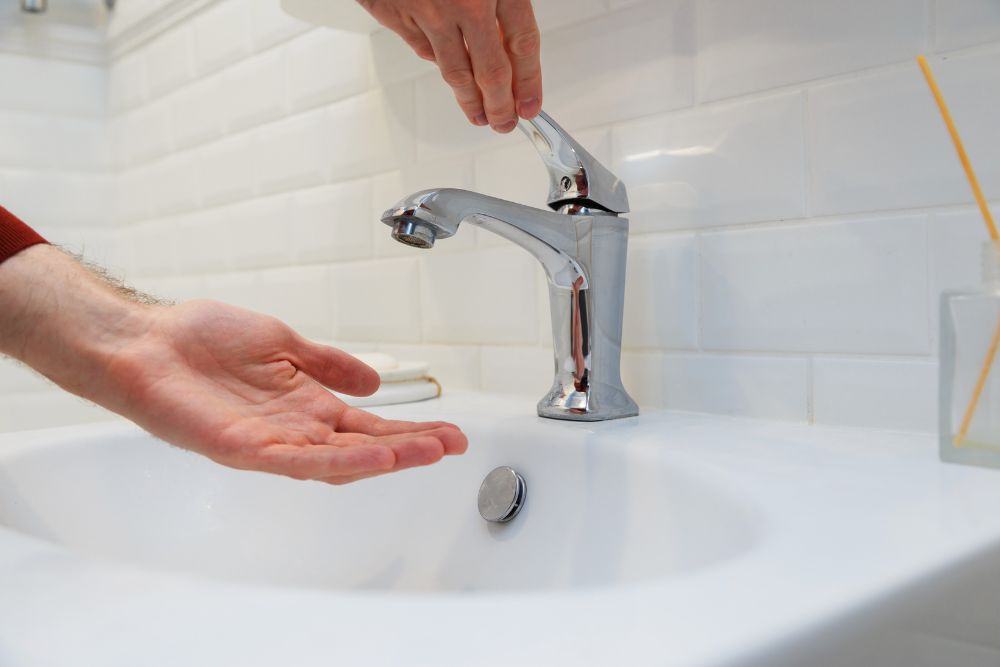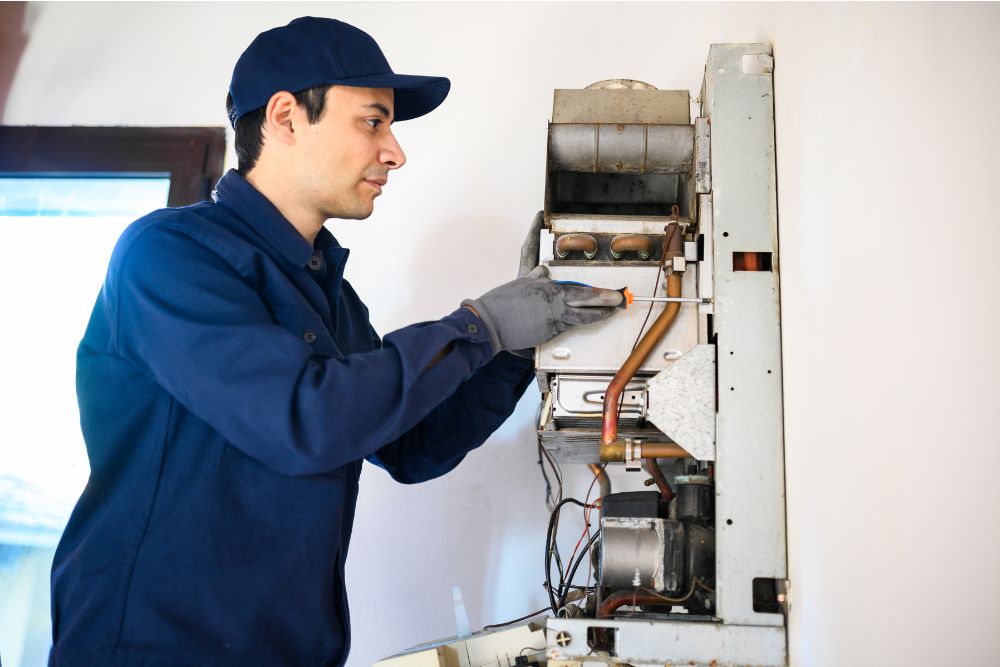
Experiencing a lack of hot water can be a significant inconvenience at least and a health issue at worst.
In this article, we will provide a comprehensive guide on what to do if you find yourself with no hot water.
We will cover common causes, immediate actions, potential fixes, and discusses renter’s rights. Whether you’re dealing with a complete absence of hot water or low pressure, this guide will equip you with the necessary knowledge to navigate and resolve the situation effectively.
Common Reasons Why You Have No Hot Water
There are a number of reasons why you might not have not water in your home or apartment.
Understanding the reasons behind hot water shortages is critical in order to correctly resolve the issue.
In this section we will cover common causes for lack of hot water, specifically in the context of hot water cylinders, continuous flow gas water heaters, and other potential factors.
Hot Water Cylinder Issues
Several factors can contribute to the absence of hot water in your hot water cylinder, impacting its efficiency and functionality.
A common reason is a faulty heating element, which is responsible for heating the water in the cylinder. This can be due to wear and tear over time or sudden electrical faults.
Another reason could be a broken thermostat. If the thermostat is not functioning properly, it won’t signal the heating element to start, resulting in cold water.
Sediment build-up inside the cylinder can also affect the heating process, as it creates a barrier between the water and the heat source.
Lastly, a tripped circuit breaker or blown fuse can disrupt electricity supply to the cylinder, preventing it from heating the water.
Continuous Flow Gas Water Heater Problems
The most prevalent reasons for not having hot water with a continuous flow gas water heater often revolve around issues with the gas supply. This could be due to a closed or partially closed gas valve, or even an interruption in the gas supply if you have Natural Gas.
Additionally, problems could stem from the ignition process, with either a malfunctioning igniter or a faulty flame sensor. The water heater’s internal components could also be at fault. For instance, a faulty thermostat could prevent the heater from reaching the designated temperature.
Lastly, external factors such as cold incoming water temperature or high demand for hot water may exceed the heater’s capacity. Each of these issues can result in a lack of hot water from your continuous flow gas water heater.
Other Reasons Why Your Hot Water Is Not Working
Aside from a faulty hot water cylinder or gas water heater, there are other common factors that could cause your hot water system to malfunction.
These problems could include:
- Faulty Plumbing: If there are issues with the plumbing in your home, such as blocked, corroded, or incorrectly installed pipes, this can affect the flow of hot water.
- Shut-off Valves: Sometimes, the valves that control the flow of water into your home might be partially or fully closed. This can restrict the flow of hot water.
- Clogged Fixtures: If the problem is isolated to one area, like a single shower or sink, it might be due to a clogged or malfunctioning fixture.
- Faulty Thermostatic Mixing Valve: These valves mix hot and cold water to achieve a safe temperature. If they malfunction, they can restrict or completely stop the flow of hot water.
- Seasonal Issues: In extremely cold weather, pipes can freeze, blocking the flow of water. This is more common in exterior walls or unheated areas of the home.
- Shared Water Systems: In multi-unit buildings, if too many people are using hot water simultaneously, you might experience a temporary shortage.
- Municipal Water Supply Problems: Issues with the municipal water supply, such as maintenance work or infrastructure failures, can sometimes affect the temperature of the water.
- Solar Water Heating Systems: If your home uses solar panels for heating water, insufficient sunlight or system malfunctions can lead to a lack of hot water.
- Electrical Issues: For homes with electric boilers or tankless systems, electrical problems can disrupt the heating of water.
- Gas Supply Problems: For gas-heated systems, issues with the gas supply, such as shut-offs or low pressure, can affect the water heating process.
- Diverter Valve Issues in Showers: In some shower systems, a faulty diverter valve can lead to a lack of hot water.
- Aging Plumbing Systems: Over time, plumbing systems can degrade, leading to various issues, including problems with hot water supply.
- Pressure-Balancing Issues: In some plumbing systems, especially in older homes, high demand in one part of the house can lead to a drop in hot water pressure in another part.
- Sediment Build-up in Pipes: Over time, sediment can build up in the pipes, reducing the flow of water, including hot water.
- Cross-Connected Pipes: If cold and hot water pipes are incorrectly connected somewhere in the system, it can lead to a mixing of the two, resulting in lukewarm or cold water output.
Who Should You Call If You Have No Hot Water?

If you find yourself without hot water, you should contact an Auckland plumber as promptly as possible.
A good plumber is skilled and equipped to diagnose the problem accurately and fix it efficiently. Their expertise covers all components of a plumbing systems and water heaters, including the heating elements, thermostat, pressure relief valve, and tank.
Before calling for help, ensure you have enough information about the problem. This includes the brand and model of your hot water system, its age, and any unusual sounds or leaks. It’s also necessary to describe whether the issue is complete lack of hot water or intermittent hot water. This information will help the plumber understand and resolve the issue faster.
What to Do If You Have No Hot Water In Your Rented House
If you are experiencing a lack of hot water in your rented property in New Zealand, certain steps should be taken to promptly address the issue.
First and foremost, it is crucial to identify whether the problem lies within your specific unit or if it is a widespread issue.
If the problem seems isolated to your unit, here are some steps you can follow:
- Check the water heater settings: Make sure the temperature is set correctly, and the heater is not in ‘vacation’ or ‘sleep’ mode.
- Reset your water heater: In some cases, simply resetting your water heater can solve the problem.
If you have completed these steps and the problem persists, you should contact your landlord or property manager and let them know about this issue. Typically, they will either handle the problem or ask you to call a plumber to take a look. Make sure to ask them who covers the cost so that you don’t get hit with an unexpected bill. Typically, the landlord will pay for these expenses in New Zealand.
How to Fix No Hot Water
In the event that the aforementioned steps do not yield results, it is imperative to delve into more detailed solutions to restore hot water supply in your residence.
One common approach is to inspect the water heater. Check the thermostat, ensuring it is set at an appropriate temperature, usually between 50 and 60 degrees Celsius.
If adjusting the thermostat does not resolve the issue, consider the possibility of a faulty heating element. This can be established through a process of elimination and may require the assistance of a professional plumber.
Also, sediment build-up in the tank can hinder the heater’s efficiency. Draining and flushing out the tank can rectify this problem.
In instances where the water heater is beyond repair, replacement becomes necessary. Always consult with a licensed professional to ensure correct installation and safety measures.
If you use a gas water heater, the pilot light might have gone out. Relighting it, following the manufacturer’s instructions carefully, may restore your hot water supply.
How to Fix No Hot Water Pressure
No hot water pressure is usually a significant problem, as it can affect everything from your shower to your kitchen sink.
Low hot water pressure can be due to a number of issues, but the most common culprits are:
- Blockages: These can occur in the pipes, reducing the flow of water. This can be due to sediment build-up or corrosion.
- Faulty pressure reducing valve (PRV): This valve is designed to reduce the water pressure from the city water supply to a safe level for your home. If it malfunctions, it can cause low water pressure.
To fix these issues, it’s usually best to call a plumber. In the case of blockages, they can clear the pipes or replace them if necessary. If the PRV is faulty, a plumber can adjust or replace the valve. It’s always a good idea to seek professional help to ensure the job is done correctly and safely.
Frequently Asked Questions
What Steps Can I Take to Prevent Hot Water Issues in the Future?
Preventing hot water issues can be achieved by regular maintenance of your water heating system, insulating pipes, setting appropriate water temperature, and timely replacement of old units. A professional plumber can provide further preventive advice.
What Are the Potential Health Risks Associated With Not Having Hot Water in a Household in New Zealand?
Potential health risks of lacking hot water in a household could include increased likelihood of bacterial growth, decreased hygiene due to inadequate washing facilities, and potential respiratory issues from cold temperatures.
Are There Any Government Assistance Programs in New Zealand to Help Low-Income Households With Hot Water Problems?
Yes, in New Zealand, the government offers assistance through the Energy Efficiency and Conservation Authority (EECA) which provides subsidies for heating and insulation improvements for low-income households, potentially addressing hot water problems.
Having Hot Water Issues? We Can Help!
If you find yourself without hot water, speak to our team today by calling 022 444 6474
or emailing info@complexplumbing.co.nz. As professional plumbers, we are able to diagnose and repair any hot water issues.

